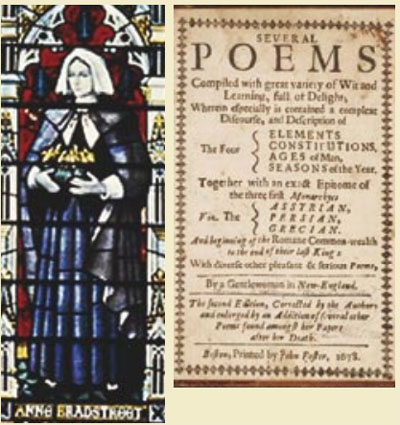国務省出版物
女性実力者の系譜-植民地時代「アン・ダドリー・ブラッドストリート」

(左) アン・ブラッドストリート。英国リンカーンシャー州ボストンの聖ボトルフ教会のステンドグラス
(右) 『第10番目の詩神』1650年版の口絵
「最近アメリカに現れた第10番目の詩神」
1612年頃生まれ、1672年9月16日死去
アメリカで最初の重要な詩人、アン・ダドリー・ブラッドストリートは、清教徒となった裕福な両親の子どもとして英国で生まれ、16歳でサイモン・ブラッドストリートと結婚した。1630年に、マサチューセッツ湾植民地を建設した清教徒の一員として、両親や夫ともに北アメリカに船でやってきた。当時の多くの女性と違って、アン・ブラッドストリートは本好きの子どもとして成長し、文学、歴史、古典の優れた教育を受けた。彼女は8人の子どもを育て、家事をこなし、植民地の総督である夫のために女主人の役割を務めながら、詩を書いた。
彼女が知らないうちに、義理の弟が彼女の詩を英国に持ち帰った。それらは1650年に、『最近アメリカに現れた第10番目の詩神(The Tenth Muse Lately Sprung Up in America)』として英国で出版された。これは、彼女の存命中に出版された唯一の詩集だが、皮肉なことに、今日では、最も面白くない作品とみなされている。これらの詩は英国の形而上派詩人の影響を受け、長くて、ときに単調なものが多く、四季を通じて眺めた、宗教などの陳腐なテーマを扱っている。現代の批評家や彼女の作品の支持者たちは、日常生活に題材をとったウィットの効いた詩や、生後1カ月の孫の死に対する感情を詠ったものなど、夫や子どもたちに向けた温かく愛情深い詩を好む。
彼女の作品や、アン・ブラッドストリートについて残っているわずかばかりの記録から、彼女が高い知性と勇気を備えた女性だったことがわかる。彼女は、自分の住む社会が、家事を超えて挑戦する女性を容認しないことを、痛切に感じていた。ある詩の中で彼女は、「私は口うるさい人々に嫌われている。彼らは言う、私の手には針が似合う、と!」と言い放った。そして、彼女は、自分の夫と父親を含む植民地の男性が、反逆者であるアン・ハッチンソンを自分たちの階層から追放しようとしているにもかかわらず、あえてハッチンソンの友人であり続けた。
アン・ブラッドストリートの文学的才能、家族への献身と愛と喪失という普遍的テーマの探求、そして物議をかもす友人の側に立つという勇気は、世界中の女性だけでなく男性にとっても、彼女を魅力的なモデルにしているのである。
私の親愛なる愛情深い夫へ
もし2つが1つだとしたら、それはきっと私たち。
もし男が妻に愛されるとしたら、それはあなた。
もし妻が1人の男に幸せを感じているとしたら、
私と比べてごらん、女たちよ、できるのであれば。
私はあなたの愛を尊ぶ、すべての金鉱よりも、
あるいは東洋が持つというすべての富よりも。
私の愛は、川も冷ますことができず、
あなたからの愛でしか代償を与えることができない。
あなたの愛に私が報いることなどできない。
天があなたに何倍も褒美をくれるよう、私は祈る。
そうすれば、私たちの生ある限り、愛を貫こう。
そして命尽きるとき、永遠に生きられるように。
『私の親愛なる愛情深い夫へ』(Several Poemsより)。アン・ブラッドストリート。
ボストン、ジョン・フォスター、1678年
*上記の日本語文書は参考のための仮翻訳で、正文は英文です。
Anne Dudley Bradstreet - American women help the new nation - Women of Influence
The first important American poet, Anne Dudley Bradstreet was born in England of prosperous parents who had embraced the Puritan faith. She was married at 16 to Simon Bradstreet. With her parents and husband, she sailed to North America in 1630 as a member of the Puritan group that founded the Massachusetts Bay Colony. Unlike most women at that time, Anne Bradstreet grew up with a love of books and received an excellent education in literature, history, and the classics. She wrote poems while she raised eight children, kept a home, and served as a hostess for her husband, a governor of the colony.
Her brother-in-law took her poems to England without her knowledge. They were published there in 1650 as The Tenth Muse Lately Sprung Up in America. Ironically, these – the only poems published during her lifetime – are today considered her least interesting. Inspired by English metaphysical poets, they are long and often dull, dealing with conventional subjects such as religion as seen through the seasons. Contemporary critics and defenders of her work prefer her witty poems on daily life and her warm and loving verses to her husband and children, including one on her feelings upon the death of a month-old grandchild.
Her writings and the few records that remain about Anne Bradstreet reveal her to be a woman of high intelligence and courage. She was painfully aware of her society's disapproval of women who ventured beyond their domestic duties. In one of her poems, she proclaimed, "I am obnoxious to each carping tongue,/That says my hand a needle better fits!" And she dared to remain a friend of Anne Hutchinson, even as the men in the colony, including her husband and father, worked to banish the dissenter from their ranks.
Anne Bradstreet's literary gifts; her exploration of the universal themes of devotion to family, love, and loss; and her courage in standing by controversial friends make her an attractive model for women – and men – everywhere.
"To my Dear and Loving Husband" from Several Poems.
Anne Bradstreet. Boston: John Foster, 1678
If ever two were one, then surely we.
If ever man were lov'd by wife, then thee.
If ever wife was happy in a man,
Compare with me, ye women, if you can.
I prize thy love more than whole Mines of gold,
Or all the riches that the East doth hold.
My love is such that Rivers cannot quench,
Nor ought but love from thee give recompetence.
Thy love is such I can no way repay.
The heavens reward thee manifold, I pray.
Then while we live, in love let's so persever,
That when we live no more, we may live ever.




